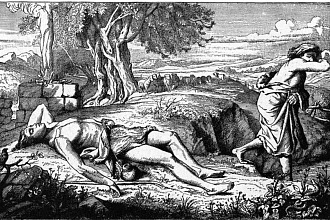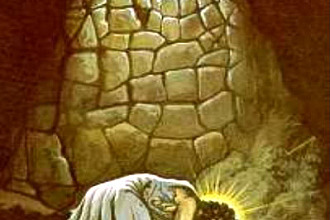The Torah says, “Then the Lord God took the man and put him in the Garden of Eden to tend and keep it. And the Lord God commanded the man, saying, ‘Of every tree of the garden you may freely eat; but of the tree of the knowledge of good and evil you shall not eat, for in the day that you eat of it you shall surely die.’” Genesis 2:15-17
“Now the serpent was more cunning than any beast of the field which the Lord God had made. And he said to the woman, ‘Has God indeed said, “You shall not eat of every tree of the garden”?’ And the woman said to the serpent, ‘We may eat the fruit of the trees of the garden; but of the fruit of the tree which is in the midst of the garden, God has said, “You shall not eat it, nor shall you touch it, lest you die.”’
Then the serpent said to the woman, ‘You will not surely die. For God knows that in the day you eat of it your eyes will be opened, and you will be like God, knowing good and evil.’ So when the woman saw that the tree was good for food, that it was pleasant to the eyes, and a tree desirable to make one wise, she took of its fruit and ate. She also gave to her husband with her, and he ate. Then the eyes of both of them were opened, and they knew that they were naked; and they sewed fig leaves together and made themselves coverings.’” Genesis 3:1-7
Did Eve state the truth when she said, “We may eat the fruit of the trees of the garden; but of the fruit of the tree which is in the midst of the garden, God has said, ‘You shall not eat it, nor shall you touch it, lest you die.’”? No, not fully. While God did say “Of every tree of the garden you may freely eat; but of the tree of the knowledge of good and evil you shall not eat, for in the day that you eat of it you shall surely die.” God didn’t say you would die if you touch it.
From this we can learn that making additional tests and standards that God didn’t impose does not keep us free from sin. While it certainly isn’t a bad an idea not to even touch things we shouldn’t be eating or to avoid willfully walk into temptation, it isn’t a good idea to pass off man-made restrictions as the word of God.
After she saw how beautiful the fruit was and touched it, it was easier to go further and actually eat it. While it would have been great to avoid the tree altogether, if she recognized that merely touching the fruit was not a sin and but purely a made up restriction, she may not have been as confident to take the next step and actually sin by eating it when she didn’t notice any evidence of punishment from touching it.
When we confuse extra rules about what we should do with what God actually says, however good our intentions may be, instead of being a barrier to sin it may actually aid it. When people don’t know the difference between God’s word and man’s, when they doubt human restrictions that lack solid evidence in the Bible for support, they may go still further to doubt God’s laws as well.
So take precautions to avoid sin, don’t walk into temptation, but at the same time don’t make up extra stuff that the Bible doesn’t actually say and try to enforce it as a Biblical rule just to be “safe” or ensure you don’t sin. You are not doing God any favors by adding to His words and in the end you may just mess yourself and others up even more when faced with temptations than you would without the man-made restrictions. As the Torah says, "Do not add to the Word that I tell you, and do not take away from it. Keep the Laws of the Lord your God which I tell you." Deuteronomy 4:2
Picture originally found here


























